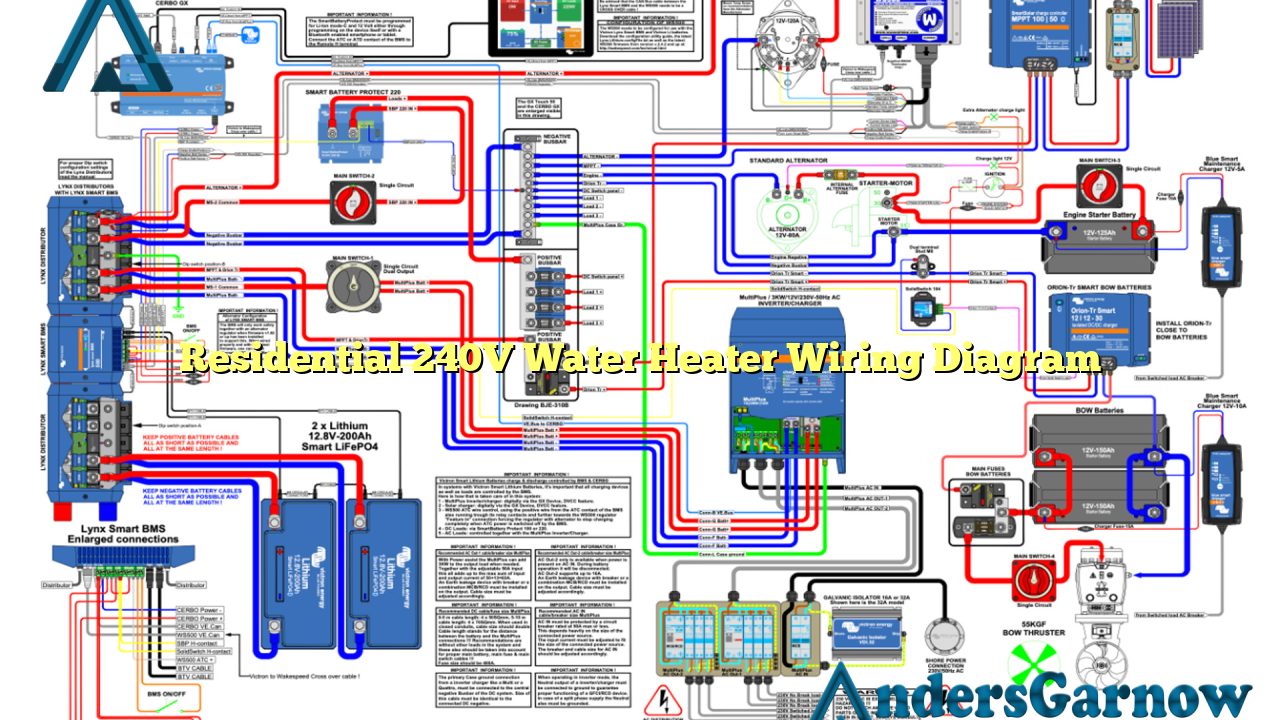Hello readers! Today, we will be discussing the topic of residential 240V water heater wiring diagram. This article aims to provide you with a detailed guide on how to properly wire a 240V water heater in your home. So, if you’re ready to learn, let’s dive right in!
1. Understanding the Basics of a 240V Water Heater
Before we get into the wiring diagram, it’s essential to understand the basics of a 240V water heater. Unlike traditional water heaters that operate on 120V, a 240V water heater requires a higher voltage for efficient performance. It is crucial to ensure that your home’s electrical system can handle the increased load before proceeding with the installation.
2. Safety Precautions
Prior to any electrical work, always prioritize safety. Make sure to turn off the power supply to the water heater at the circuit breaker panel. Use a voltage tester to verify that there is no electricity running to the unit before proceeding with the wiring process.
3. Gather the Necessary Tools and Materials
Before you begin wiring your 240V water heater, gather all the required tools and materials. This includes electrical tape, wire connectors, a screwdriver, a wire stripper, and the appropriate gauge wire for your specific water heater model.
4. Wiring the Circuit Breaker
The first step in the wiring process is to connect the circuit breaker. Install a double-pole circuit breaker of the appropriate amperage rating for your water heater. Connect the hot wires to the breaker and the neutral wire to the neutral bus bar in the breaker panel.
5. Running the Wiring
Next, run the appropriate gauge wire from the circuit breaker panel to the water heater location. Ensure that the wire is properly secured and protected throughout its entire length.
6. Connecting the Wires to the Water Heater
Once the wire reaches the water heater, strip the insulation from the wire ends. Connect the black wire to the black wire on the water heater, the white wire to the white wire, and the bare copper wire to the green grounding screw on the unit.
7. Grounding the Water Heater
Proper grounding is crucial for the safety of your 240V water heater. Ensure that the water heater’s metal case is securely connected to the grounding wire to prevent electrical shocks or other hazards.
8. Testing the Wiring
After completing the wiring process, it’s important to test the connections to ensure they are secure and functioning correctly. Turn on the circuit breaker and use a voltage tester to verify that there is power running to the water heater.
9. Advantages and Disadvantages of a 240V Water Heater Wiring
There are several advantages to wiring a water heater with 240V. Firstly, it allows for faster heating and recovery times, ensuring a steady supply of hot water. Additionally, a 240V water heater is more energy-efficient compared to a 120V unit. However, the main disadvantage is that the wiring process is more complex and requires a higher level of electrical knowledge.
10. Alternative Wiring Options
While the 240V wiring is the standard method for residential water heaters, there are alternative options available. Some homeowners may opt for a 120V water heater if their electrical system cannot accommodate the higher voltage. However, it’s important to consider the potential drawbacks, such as slower heating times and higher energy consumption.
Residential 240V Water Heater Wiring Diagram – Complete Information Table
| Component | Wire Color | Connection |
|---|---|---|
| Hot Wire | Black | Connects to black wire on the water heater |
| Neutral Wire | White | Connects to white wire on the water heater |
| Ground Wire | Bare Copper | Connects to the green grounding screw on the water heater |
Conclusion
In conclusion, properly wiring a residential 240V water heater is essential for its safe and efficient operation. By following the steps outlined in this article, you can ensure that your water heater is wired correctly. Remember to prioritize safety and consult a professional if you are unsure about any aspect of the process. Enjoy your reliable supply of hot water!
Frequently Asked Questions (FAQ)
Q: Can I wire a 240V water heater myself?
A: Yes, you can wire a 240V water heater yourself if you have the necessary knowledge and experience. However, it is recommended to consult a licensed electrician to ensure proper installation and comply with local electrical codes.
Q: What gauge wire should I use for a 240V water heater?
A: The gauge of wire you should use depends on the amperage rating of your water heater. Refer to the manufacturer’s instructions or consult a professional electrician to determine the appropriate wire gauge for your specific model.
Q: Is it necessary to ground a 240V water heater?
A: Yes, it is crucial to properly ground a 240V water heater to prevent electrical shocks and ensure safety. Make sure the water heater’s metal case is securely connected to the grounding wire.
Q: Can I use a 120V water heater instead of a 240V unit?
A: While it is possible to use a 120V water heater, it may result in slower heating times and higher energy consumption. Additionally, not all models are available in 120V options. It is best to assess your electrical system’s capabilities and consult a professional before making a decision.

